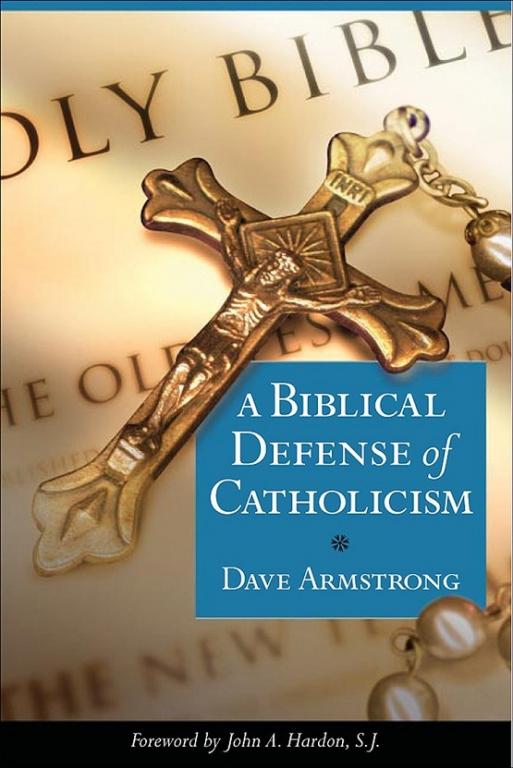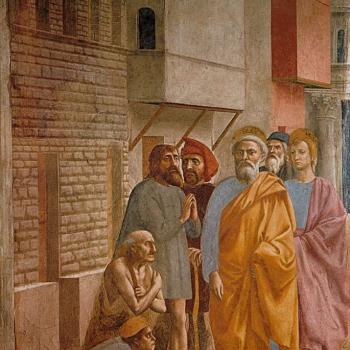
From my book, A Biblical Defense of Catholicism, completed in 1996 and published by Sophia Institute Press, in 2003; pp. 80-83. The book is available for $2.99 in several e-book formats.
*****
The daunting word transubstantiation is easily understood when broken down: trans means “change.” Therefore, the term is defined literally as the process of change of substance. The Catholic Church, in seeking to understand the Real Presence, a doctrine delivered directly by our Lord and St. Paul, gradually developed an explanation as to the exact nature of this miraculous and mysterious transformation.
Contrary to the common misconception, transubstantiation is not dependent upon Aristotelian philosophy, since some notion of the concept goes back to the earliest days of the Church, when Aristotle’s philosophy was not known. The eastern Fathers, before the sixth century, used the Greek expression metaousiosis, or “change of being,” which is essentially the same idea.
The Church did, however, draw upon prevalent philosophical categories, such as substance and accidents. In all ages, Christians have sought to defend Christianity by means of philosophy and human learning (wherever the individual intellectual categories utilized were consistent with Christian Faith). St. Paul, for instance, did this in his sermon on Mars Hill in Athens, where he made reference to pagan poets and philosophers (Acts 17:22-31). St. Augustine incorporated elements of Platonic thought into his theology, and St. Thomas Aquinas synthesized Aristotle and Christianity into a unified, consistent system of Christian thought (Scholasticism or Thomism).
Transubstantiation is predicated upon the distinction between two sorts of change: accidental change occurs when nonessential outward properties are transformed in some fashion. Thus, water can take on the properties of a solid (ice) or of a gas (steam), while remaining chemically the same. A substantial change, on the other hand, produces something else altogether. An example of this is the metabolism of food, which becomes part of our bodies as a result of chemical and biological processes initiated by digestion. In our everyday experience, a change of substance is always accompanied by a corresponding transition of accidents, or properties.
But in the Eucharist — a supernatural transformation — substantial change occurs without accidental alteration. Thus, the properties of bread and wine continue after consecration, but their essence and substance cease to exist, replaced by the substance of the true and actual Body and Blood of Christ. It is this disjunction from the natural laws of physics which causes many to stumble (see John 6:60-69). The following chart may be helpful for understanding different types of change:
A Comparison of Accidental and Substantial Change
| Type of change | Example | Accidents (appearance) | Substance (essence) |
|---|---|---|---|
| Natural Accidental | Water to ice or steam | Changed | Same |
| Natural Substantial | Metabolism of food | Changed | Changed |
| Supernatural Accidental | Miracles of the loaves (Matt. 14:19) | Changed (quantity) | Same |
| Supernatural Substantial | Transubstantiation | Same | Change |
*
Transubstantiation is difficult for the natural mind (especially with its modern excessively skeptical bent) to grasp and clearly requires a great deal of faith. Yet many aspects of Christianity that conservative, Evangelical, orthodox Christians have no difficulty believing transcend reason and must ultimately be accepted on faith, such as the Incarnation (in which a helpless infant in Bethlehem is God!), the Resurrection, the omniscience of God, the paradox of grace versus free will, eternity, the union of the human and divine natures in Christ (the Hypostatic Union), the Fall of Man and Original Sin, and the Virgin Birth, among many other beliefs. Transubstantiation may be considered beyond reason, yet it is not opposed to reason; suprarational, but not irrational, much like Christian theology in general.
If one accepts the fact that God became Man, then it cannot consistently be deemed impossible (as many casually assume) for him to become truly and really present under the appearances of bread and wine. Jesus, after his Resurrection, could apparently walk through walls while remaining in his physical (glorified) body (John 20:26-27). How, then, can the Real Presence reasonably be regarded as intrinsically implausible by supernaturalist Christians?
Likewise, much of the objection to this doctrine seems to arise out of a pitting of matter against spirit, or, more specifically, an a priori hostility toward the idea that grace can be conveyed through matter (which notion is the basis of sacramentalism). This is exceedingly curious, since precisely this concept is fundamental to the Incarnation of our Lord Jesus. If God did not take on matter and human flesh, no one would have been saved. Such a prejudice is neither logical (given belief in the miraculous and Christian precepts) nor scriptural, as we shall see.
Cardinal Newman, whom very few would accuse of being unreasonable or credulous, had this to say about the “difficulties” of transubstantiation:
People say that the doctrine of Transubstantiation is difficult to believe. . . . It is difficult, impossible to imagine, I grant — but how is it difficult to believe? . . . For myself, I cannot indeed prove it, I cannot tell how it is; but I say, “Why should it not be? What’s to hinder it? What do I know of substance or matter? Just as much as the greatest philosophers, and that is nothing at all.” . . . And, in like manner . . . the doctrine of the Trinity in Unity. What do I know of the Essence of the Divine Being? I know that my abstract idea of three is simply incompatible with my idea of one; but when I come to the question of concrete fact, I have no means of proving that there is not a sense in which one and three can equally be predicated of the Incommunicable God. (Apologia Pro Vita Sua [Garden City, New York: Doubleday Image, 1956; originally 1864], 318. Newman’s Apologia is his religious autobiography)
Once one realizes that transubstantiation is a miracle of God, any thought of impossibility vanishes, since God is omnipotent and the sovereign Lord over all creation (Matt. 19:26; Phil. 3:20-21; Heb. 1:3). If mere men can change accidental properties without changing substance (for example, turning iron into molten liquid or even vapor), then God is certainly able to change substance without outward transmutation.
Therefore, having disposed of these weak philosophical objections, we can proceed to examine the clear and indisputable biblical data that reveal to us that God does in fact perform (through the agency of priests) the supernatural act of transubstantiation.
***












